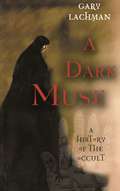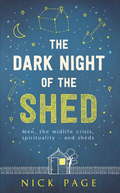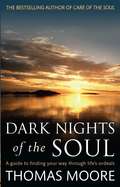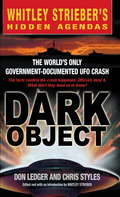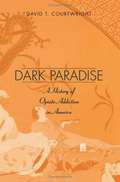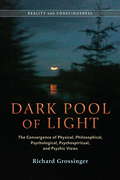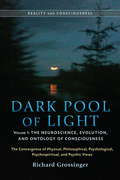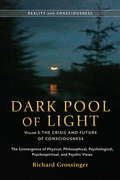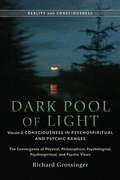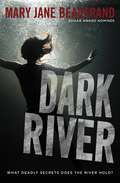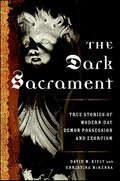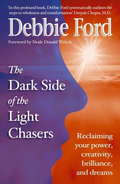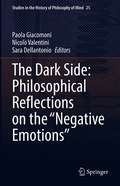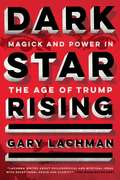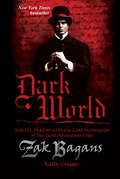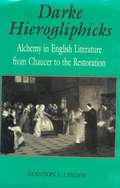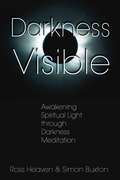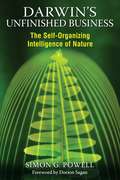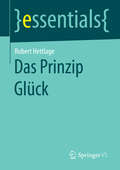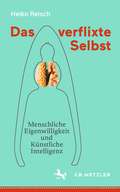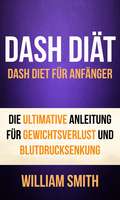- Table View
- List View
A Dark Muse: A History of the Occult
by Gary LachmanThe occult was a crucial influence on the Renaissance, and it obsessed the popular thinkers of the day. But with the Age of Reason, occultism was sidelined; only charlatans found any use for it. Occult ideas did not disappear, however, but rather went underground. It developed into a fruitful source of inspiration for many important artists. Works of brilliance, sometimes even of genius, were produced under its influence. In A Dark Muse, Lachman discusses the Enlightenment obsession with occult politics, the Romantic explosion, the futuristic occultism of the fin de siècle, and the deep occult roots of the modernist movement. Some of the writers and thinkers featured in this hidden history of western thought and sensibility are Emanuel Swedenborg, Charles Baudelaire, J. K. Huysmans, August Strindberg, William Blake, Goethe, Madame Blavatsky, H. G. Wells, Edgar Allan Poe, and Malcolm Lowry.
The Dark Night of the Shed: Men, the midlife crisis, spirituality - and sheds
by Nick PageMen, the midlife crisis, spirituality - and shedsA new bike - running the marathon - splashing out on a sports car - having an affair - taking up triathlon - upping sticks and moving to the country - getting divorced - even going into the church...There's a point in a man's life where he looks around him and asks whether this is really where he wants to be - what he wanted to do with his life. And even if he's achieved all his childhood dreams, maybe that's not enough any more.Nick Page has been there, and he decided to build a shed. Not to answer the question, but so that he'd at least be able to get some peace to think about it properly. Join him on a journey of discovery, into what the midlife crisis really is, and whether there's a better way to go at it than frittering away time and money trying to pretend you're really younger than you are.
The Dark Night of the Shed: Men, the midlife crisis, spirituality - and sheds
by Nick PageMen, the midlife crisis, spirituality - and shedsA new bike - running the marathon - splashing out on a sports car - having an affair - taking up triathlon - upping sticks and moving to the country - getting divorced - even going into the church...There's a point in a man's life where he looks around him and asks whether this is really where he wants to be - what he wanted to do with his life. And even if he's achieved all his childhood dreams, maybe that's not enough any more.Nick Page has been there, and he decided to build a shed. Not to answer the question, but so that he'd at least be able to get some peace to think about it properly. Join him on a journey of discovery, into what the midlife crisis really is, and whether there's a better way to go at it than frittering away time and money trying to pretend you're really younger than you are.
Dark Nights Of The Soul: A guide to finding your way through life's ordeals
by Thomas MooreA 'dark night of the soul' is not a psychological syndrome, but a quest for meaning during life's darkest hours: the loss of a loved one, the end of a relationship, ageing and illness, career disappointments or just an ongoing dissatisfaction with life. Thomas Moore's extensive experience as a psychologist and theologian has taught him that the dark night is a challenge to restore ourselves and to become someone of substance, depth and soul. By using these trying times as an opportunity to reflect and delve into the soul's deepest needs, we can find a new understanding of life's meaning. Dark Nights of the Soul has its roots in a favourite chapter in Thomas Moore's million copy bestseller, Care of the Soul. In this beautifully-written and thought-provoking work he explores our contemporary anxieties and insecurities and shows how these metaphoric dark nights can become transforming rites of passage.
Dark Object: The World's Only Government-documented Ufo Crash
by Don Ledger Chris StylesMayday over Canada . . . the world's only government-documented UFO crash. In 1965 a massive wave of UFO sightings occurs worldwide. In 1967 residents of Shag Harbor, Canada, witness a huge UFO crash into the bay. Three Royal Canadian Mounties watch it float before sinking. Navy divers mount an extensive search. Now officials say nothing ever happened. Why? Researchers Don Ledger and Chris Styles — Styles himself an eyewitness to the Shag Harbor crash — have tackled one of the best documented and most top-secret incidents in the annals of UFO sightings. What they have found out will astound — and outrage — readers. From mysterious surveillance twenty-five years after the crash to the sudden disappearance of written records, someone wanted the investigation stopped. But Ledger and Styles now file their stunning report — and reach a chilling conclusion about the Dark Object, what really happened, and what remains hidden today. . . .
Dark Object
by Don Ledger Chris StylesMayday over Canada ... the world's only government-documented UFO crash.In 1965 a massive wave of UFO sightings occurs worldwide. In 1967 residents of Shag Harbor, Canada, witness a huge UFO crash into the bay. Three Royal Canadian Mounties watch it float before sinking. Navy divers mount an extensive search. Now officials say nothing ever happened. Why?Researchers Don Ledger and Chris Styles -- Styles himself an eyewitness to the Shag Harbor crash -- have tackled one of the best documented and most top-secret incidents in the annals of UFO sightings. What they have found out will astound -- and outrage -- readers. From mysterious surveillance twenty-five years after the crash to the sudden disappearance of written records, someone wanted the investigation stopped. But Ledger and Styles now file their stunning report -- and reach a chilling conclusion about the Dark Object, what really happened, and what remains hidden today....From the Paperback edition.
Dark Paradise: A History of Opiate Addiction in America
by David T. CourtwrightDavid T. Courtwright offers an original interpretation of a puzzling chapter in American social and medical history: the dramatic change in the pattern of opiate addiction--from respectable upper-class matrons to lower-class urban males, often with a criminal record. Dark Paradise tells the story not only from the standpoint of legal and medical sources, but also from the perspective of addicts themselves.
Dark Pool of Light 3 Volume Set
by Richard Grossinger Jeffrey J. Kripal Nick Herbert Zia Inayat Khan John FriedlanderIn books like Embyogenesis and Embryos, Galaxies, and Sentient Beings, author Richard Grossinger brought together the subjects of biological embryology and the esoteric process of human consciousness becoming embodied ("The embryo is the universe writing itself on its own body"). In Dark Pool of Light, his latest creation, Grossinger weaves neuroscience-based behaviorism and the phenomenology of "being" and reality together with psychological and psychospiritual views of "that single thing which is most difficult to understand or vindicate: our own existence." In 2008 Grossinger began studying with noted psychic teacher John Friedlander, who helped him refine his vision of cerebral and somatic awareness to still subtler levels. "Dark Pool of Light began unnamed in the journals of my psychic work with John Friedlander," says Grossinger, "not so much a record of actual practices as insights from them and extensions out of them." An expansive inquiry into the nature of consciousness, the series examines the tension between the scientific and philosophical, and psychic views of the same phenomena, and includes "field notes" and experiential exercises that invite the reader to make their own explorations. Dark Pool of Light is divided into three volumes: in Volume 1, Grossinger begins with the scientific and philosophical, analytical views of reality, exploring the science, parascience, philosophy, and psychology of consciousness. Covering topics as diverse as current discoveries in neuroscience and the philosophy of the ancient Greeks, the book gives a broad overview of the bodies of knowledge concerning the nature of reality and consciousness. Volume Two discusses the similarities and differences between European esoteric traditions and Buddhism in their approaches to the subjects, and gives a detailed description of the psychic training Grossinger undertook that informs much of his worldview. This expansive inquiry into the nature of consciousness ends with this third volume in the series, The Crisis and Future of Consciousness. Grossinger addresses the perennial question of evil and shares the author's hopes and fears for the future of humanity. While wisdom gleaned from such seemingly disparate sources as science, philosophy, religion, and spirituality might appear "very, very different things," Grossinger nevertheless finds their meeting place in subjective, lived experience.
Dark Pool of Light, Volume One
by Richard Grossinger Jeffrey J. Kripal Nick HerbertIn books like Embryogenesis and Embryos, Galaxies, and Sentient Beings, author Richard Grossinger brought together the subjects of biological embryology and the esoteric process of human consciousness becoming embodied ("The embryo is the universe writing itself on its own body"). In Dark Pool of Light, his latest creation, Grossinger weaves neuroscience-based behaviorism and the phenomenology of "being" and reality together with psychological and psychospiritual views of "that single thing which is most difficult to understand or vindicate: our own existence." In 2008 Grossinger began studying with noted psychic teacher John Friedlander, who helped him refine his vision of cerebral and somatic awareness to still-subtler levels. "Dark Pool of Light began unnamed in the journals of my psychic work with John Friedlander," says Grossinger, "not so much a record of actual practices as insights from them and extensions out of them." An expansive inquiry into the nature of consciousness, the series examines the tension between the scientific and philosophical, and psychic views of the same phenomena, and includes "field notes" and experiential exercises that invite the reader to make their own explorations. Dark Pool of Light is divided into three volumes, which the author calls "movements"; the allusion to music is apt, for the book unfolds in a truly symphonic manner. In Volume 1, Grossinger begins with the scientific and philosophical, analytical views of reality, exploring the science, parascience, philosophy, and psychology of consciousness. Covering topics as diverse as current discoveries in neuroscience and the philosophy of the ancient Greeks, the book gives a broad overview of the bodies of knowledge concerning the nature of reality and consciousness.
Dark Pool of Light, Volume Three
by Richard Grossinger Zia Inayat Khan Curtis MccoscoIn books like Embyogenesis and Embryos, Galaxies, and Sentient Beings, author Richard Grossinger brought together the subjects of biological embryology and the esoteric process of human consciousness becoming embodied ("The embryo is the universe writing itself on its own body"). In Dark Pool of Light, his three-volume series of books discussing the nature of reality and consciousness, Grossinger weaves neuroscience-based behaviorism and the phenomenology of "being" and reality together with psychological and psychospiritual views of "that single thing which is most difficult to understand or vindicate: our own existence." In 2008, Grossinger began studying with noted psychic teacher John Friedlander, who helped him refine his vision of cerebral and somatic awareness to still-subtler levels. "Dark Pool of Light began unnamed in the journals of my psychic work with John Friedlander," says Grossinger, "not so much a record of actual practices as insights from them and extensions out of them." This expansive inquiry into the nature of consciousness ends with this third volume in the series, The Crisis and Future of Consciousness. Grossinger addresses the perennial question of evil and shares the author's hopes and fears for the future of humanity. While wisdom gleaned from such seemingly disparate sources as science, philosophy, religion, and spirituality might appear "very, very different things," Grossinger nevertheless finds their meeting place in subjective, lived experience.
Dark Pool of Light, Volume Two
by Richard Grossinger Kenneth Warren John FriedlanderIn books like Embyogenesis and Embryos, Galaxies, and Sentient Beings, author Richard Grossinger brought together the subjects of biological embryology and the esoteric process of human consciousness becoming embodied ("The embryo is the universe writing itself on its own body"). In Dark Pool of Light, his three-volume series of books discussing the nature of reality and consciousness, Grossinger weaves neuroscience-based behaviorism and the phenomenology of "being" and reality together with psychological and psychospiritual views of "that single thing which is most difficult to understand or vindicate: our own existence." In Volume 1, Grossinger begins with the scientific and philosophical, analytical views of reality; the subtitle of that volume is The Neuroscience, Evolution, and Ontology of Consciousness. In Volume 2, Consciousness in Psychospiritual and Psychic Ranges, he examines psychic sensitivity and planes of existence from diverse experiential perspectives, including theosophy and Buddhism. In 2008, Grossinger began studying with noted psychic teacher John Friedlander, who helped him refine his vision of cerebral and somatic awareness to still-subtler levels. "Dark Pool of Light began unnamed in the journals of my psychic work with John Friedlander," says Grossinger, "not so much a record of actual practices as insights from them and extensions out of them." An expansive inquiry into the nature of consciousness, this volume includes these "field notes" and observations from Grossinger's studies in the imaginal psychic realm, as well as exercises to invite the reader to experience these dimensions for themselves.
Dark River
by Mary Jane BeaufrandWhen Ronnie moves from her home in the city to rural Oregon, she feels secluded and cut off from everything and everyone. The one person she feels connected to is a 10 year old neighborhood girl, Karen, whom she babysits for. But when she discovers Karen's body in the river, the victim of a supposed accident, Ronnie feels compelled to uncover the truth.As Ronnie becomes increasingly obsessed with solving Karen's murder, she discovers a dark underbelly to her new home and is eventually led to the truth -- a shocking secret hidden deep within the woods.Dark River is a suspenseful, atmospheric novel about murder, mystery, and the Santiam River, where the past and present converge, stirring up secrets and bringing truth to the surface.
The Dark Sacrament: True Stories of Modern-Day Demon Possession and Exorcism
by Christina McKenna David M. KielyThe Devil Is Alive and WellIn The Dark Sacrament, coauthors David M. Kiely and Christina McKenna faithfully recount ten contemporary cases of demon possession, haunted houses, and exorcisms, and profile the work of two living, active exorcists. The authors serve as trustworthy guides on this suspense-filled journey into the bizarre, offering concrete advice on how to avoid falling prey to the dark side.
The Dark Side of the Ivory Tower: Campus Crime as a Social Problem
by John J. Sloan III Bonnie S. FisherA cursory reading of the history of U. S. colleges and universities reveals that campus crime has been part of collegiate life since the Colonial Era, yet it was not until the late 1980s that it suddenly became an issue on the public stage. Drawing from numerous mass media and scholarly sources and using a theoretical framework grounded in social constructionism, this text chronicles how four groups of activists - college student advocates, feminists, victims and their families, and public health experts - used a variety of tactics and strategies to convince the public that campus crime posed a new danger to the safety and security of college students and the ivory tower itself, while simultaneously convincing policymakers to take action against the problem. Readers from a range of disciplinary interests will find the book both compelling and valuable to understanding campus crime as a newly constructed social reality.
Dark Side of the Light Chasers: Reclaiming your power, creativity, brilliance, and dreams
by Debbie FordIn this enlightening guide, Debbie Ford explains that the dark side of our personality should not be hidden. By denying our dark side, we reject these aspects of our true natures rather than giving ourselves the freedom to live authentically. Here she shows that it is possible to acknowledge and accept our so-called weaknesses, proving that these qualities may be important, hidden strengths. For example, perhaps some 'selfishness' can save us from exhaustion and resentment. Full of illuminating stories and practical exercises, Debbie Ford shows us how to reconcile our darker impulses and find the gifts they offer. Your life will be transformed when you unconceal, own, and embrace your shadow.
The Dark Side: Philosophical Reflections on the “Negative Emotions” (Studies in the History of Philosophy of Mind #25)
by Paola Giacomoni Nicolò Valentini Sara DellantonioThis book takes the reader on a philosophical quest to understand the dark side of emotions. The chapters are devoted to the analysis of negative emotions and are organized in a historical manner, spanning the period from ancient Greece to the present time. Each chapter addresses analytical questions about specific emotions generally considered to be unfavorable and classified as negative. The general aim of the volume is to describe the polymorphous and context-sensitive nature of negative emotions as well as changes in the ways people have interpreted these emotions across different epochs. The editors speak of ‘the dark side of the emotions’ because their goal is to capture the ambivalent – unstable and shadowy – aspects of emotions. A number of studies have taken the categorial distinction between positive and negative emotions for granted, suggesting that negative emotions are especially significant for our psychological experience because they signal difficult situations. For this reason, the editors stress the importance of raising analytical questions about the valence of particular emotions and focussing on the features that make these emotions ambivalent: how – despite their negativity – such emotions may turn out to be positive. This opens up a perspective in which each emotion can be understood as a complex interlacing of negative and positive properties. The collection presents a thoughtful dialogue between philosophy and contemporary scientific research. It offers the reader insight by illuminating the dark side of the emotions.
Dark Star Rising: Magick and Power in the Age of Trump
by Gary LachmanWithin the concentric circles of Trump's regime lies an unseen culture of occultists, power-seekers, and mind-magicians whose influence is on the rise. In this unparalleled account, historian Gary Lachman examines the influence of occult and esoteric philosophy on the unexpected rise of the alt-right.Did positive thinking and mental science help put Donald Trump in the White House? And are there any other hidden powers of the mind and thought at work in today's world politics? In Dark Star Rising: Magick and Power in the Age of Trump, historian and cultural critic Gary Lachman takes a close look at the various magical and esoteric ideas that are impacting political events across the globe. From New Thought and Chaos Magick to the far-right esotericism of Julius Evola and the Traditionalists, Lachman follows a trail of mystic clues that involve, among others, Norman Vincent Peale, domineering gurus and demagogues, Ayn Rand, Pepe the Frog, Rene Schwaller de Lubicz, synarchy, the Alt-Right, meme magic, and Vladimir Putin and his postmodern Rasputin. Come take a drop down the rabbit hole of occult politics in the twenty-first century and find out the post-truths and alternative facts surrounding the 45th President of the United States with one of the leading writers on esotericism and its influence on modern culture.
Dark World, 2nd Edition
by Zak BagansIt's easy to say ghosts exist or don't exist. Anyone can do that. Trying to figure out the why or what is a different story. Paranormal investigator Zak Bagans, host of the popular Travel Channel series Ghost Adventures, pulls from his years of experience with paranormal activities and unexplained phenomena to provide an evenhanded look at a divisive subject. In Dark World, regardless of whether you believe in the afterlife or not, Zak does his best to find and share answers to the phenomena that people encounter. He wants you to experience a haunting through his eyes: to feel what it's like to be scared, freaked out, pushed, cold, sluggish, whispered-at and touched by an ethereal being or attacked by a demonic spirit. But beyond simply experiencing these events, Zak is looking for the reasons behind them, searching for answers to the unanswered questions. Addressing all the major issues and theories of the field in an impartial way, Dark World is a must read for paranormal enthusiasts, those who don't believe and anyone who's ever wondered about things that go bump in the night.
Darke Hierogliphicks: Alchemy in English Literature from Chaucer to the Restoration
by Stanton J. LindenThe literary influence of alchemy and hermeticism in the work of most medieval and early modern authors has been overlooked. Stanton provides the first comprehensive examination of this influence on English literature from the late middle Ages.
Darkness Visible: Awakening Spiritual Light through Darkness Meditation
by Ross Heaven Simon BuxtonThe first book to examine the spiritual and therapeutic practice of retreat in physical darkness to explore inner light• Shows how experiencing complete darkness over prolonged periods helps in developing mental clarity and creativity• Draws upon many indigenous and spiritual traditions that use this techniqueThe use of ceremonial darkness is a classic and cross-cultural method for exploring hidden aspects of unconscious and super-conscious states, accessing invisible landscapes, and embracing the deeper recesses of the self. In Darkness Visible Heaven and Buxton examine the spiritual and therapeutic practice of taking retreat in physical darkness.For millennia mystics and sages have used darkness as a spiritual tool for breaking with their pasts, prior conditioning, and the limited reality of their societies. Spiritual seekers from many traditions--Celtic, Eastern, indigenous North and South American, Tibetan, and African--have used darkness as a tool for spiritual enlightenment. Heaven and Buxton show how experiencing complete darkness, even for only a period of hours, brings about a remarkable clarity and mental stillness and thus provides a springboard for creativity, intuition, and spiritual development. They include exercises that explore lucid levels of dream consciousness, drawing both from their experience as teachers of this method and from the many cultures that include this practice in their spiritual traditions. Darkness Visible shows how deprivation of sight can truly teach us to see.
Darwin's Unfinished Business: The Self-Organizing Intelligence of Nature
by Dorion Sagan Simon G. PowellA groundbreaking interpretation of evolution as the work of Nature’s intelligence • Refutes the orthodox view of evolution as a mindless process driven by chance • Explains why context is more important than mutation in evolutionary innovation • Shows how, by recognizing Nature’s innovative and creative powers, we can overcome our social and environmental challenges with a new green science of evolution Darwin’s theory of evolution is undoubtedly one of the most important scientific ideas of the modern age, explaining the existence of both life and consciousness without recourse to divine intervention. Yet how do we interpret evolution? How do we evaluate the ability of Nature to engineer something as exquisite as the genetic code or the human brain? Could it be that evolution is an intelligent process? Is Nature smart? According to most scientists, the answer is no. While humanity may be intelligent and purposeful, the natural processes that crafted us are deemed to be devoid of such attributes. In a radical move away from orthodoxy, Simon G. Powell extends Darwin’s vision by showing that evolution is not just about the survival of the fittest but rather the survival of clever and sensible behavior. Revealing the importance of the context in which things evolve, he explores the intelligent learning process behind natural selection. Rich with examples of the incredibly complex plants, animals, insects, and marine life designed by Nature--from the carnivorous Venus flytrap and the fungus-farming leafcutter ant to the symbiotic microbes found inside the common cow--he shows Nature as a whole to be a system of self-organizing intelligence in which life and consciousness were always destined to emerge. Examining the origins of life and the failure of artificial intelligence to compete with natural intelligence, he explains how our scientifically narrow-minded views on intelligence are now acting as a barrier to our own evolution. As Darwin’s unfinished business comes to light and Nature’s intelligence is embraced, we learn that Nature’s agenda is not simply the replication of genetic matter but of expanding consciousness. By working with Nature’s creative and innovative powers instead of against them, we can address today’s social and environmental challenges with a new green science of evolution.
Das Beste Verdienst Du
by Asma ElferkoussWenn Sie feststellen, dass Sie mit Ihren Ambitionen völlig aus dem Tritt geraten sind, weil Sie sich zutiefst unwürdig fühlen, fragen Sie sich, wie Sie da herauskommen und trotz allem vorankommen können? Zwischen Selbstbeobachtung und praktischen Ratschlägen wäre dieses Buch eine Gelegenheit zu beweisen, dass "Sie das Beste verdienen" ...
Das Prinzip Glück (essentials)
by Robert HettlageRobert Hettlage umreißt in seinem Essential, was es mit dem ,,großen", vernunftgesteuerten Glück auf sich hat. Dass alle Menschen nach dem Glück streben, gilt als selbstverständlich. Macht, Schönheit, Reichtum und Anerkennung stehen zwar als Ziele hoch im Kurs, bedürfen aber eines langen Atems und/oder sind schwer zu beeinflussen. In der modernen Welt scheint also eine Ratlosigkeit vorzuherrschen, die keinen anderen Ausweg weiß, als jeden Menschen individuell zum Schmied seiner Zufriedenheit und seines Wohlergehens zu erklären. Dadurch wird der Weg zu einer langen Tradition der Glücksphilosophie verbaut, die nicht bei der seelischen Befindlichkeit ansetzt, sondern bei der inneren, ,,notwendigen und hinreichenden" Qualität der Glücksgüter. An diesen Qualitäten und der trainierten Haltung ihnen gegenüber (Tugenden) bemisst sich die Lebenskunst. Obwohl Max Weber in seinen soziologischen Analysen die Entwicklung zu modernen Kontingenz, Wertpluralität und Individualität für unabwendbar und schicksalhaft erklärt, zeigen seine Erörterungen zur ,,Lebensführung", dass diese an das vormoderne Konzept der Lebenskunst anschließen kann.
Das verflixte Selbst: Menschliche Eigenwilligkeit und Künstliche Intelligenz
by Heiko ReischMenschen schreiben sich ein Selbst zu. Die Wissenschaften haben Mühe zu sagen, was das ist und wie es zustande kommt. Sie sind sich aber sicher, dass wir es haben und brauchen. Für Forscher ist es jedoch kaum greifbar und deshalb ein verflixtes Problem. Daran wird die Entwicklung einer starken KI scheitern, Menschen bleiben etwas anderes.
DASH Diät: Dash Diet für Anfänger. Die ultimative Anleitung für Gewichtsverlust und Blutdrucksenkung
by William SmithKennst Du das auch, Du möchtest abnehmen und findest einfach nicht die geeignete Diät? Mir ging es genauso und aus diesem Grund habe ich die verschiedensten unterschiedlichen Diätformen ausprobiert. Speziell die DASH-Diät hat mich fasziniert, und aus diesem Grund ist dieses Buch entstanden. Darin erfährst Du alle Vorteile aber auch die Nachteile von dieser speziellen Diät. Mit diesem Buch wirst Du also Dein Diät-Problem lösen! Dieses Buch zeigt Dir alle Vor- und Nachteile! Du lernst zum einen die DASH-Diät kennen und darüber hinaus bekommst Du eine Reihe an Rezepten an die Hand um sie sofort umsetzen zu können. Die DASH-Diät geht an die Ursache des Problems. Es handelt sich um ein ausgewogenes langfristiges Ernährungskonzept basierend auf nährstoffreicher Vollwertkost, um Bluthochdruck und das Diabetes-Risiko zu senken, und sorgt gleichzeitig dafür gesund Gewicht zu verlieren. Tun Sie sich und Ihrer Gesundheit etwas Gutes und holen Sie sich heute noch dieses Buch!
